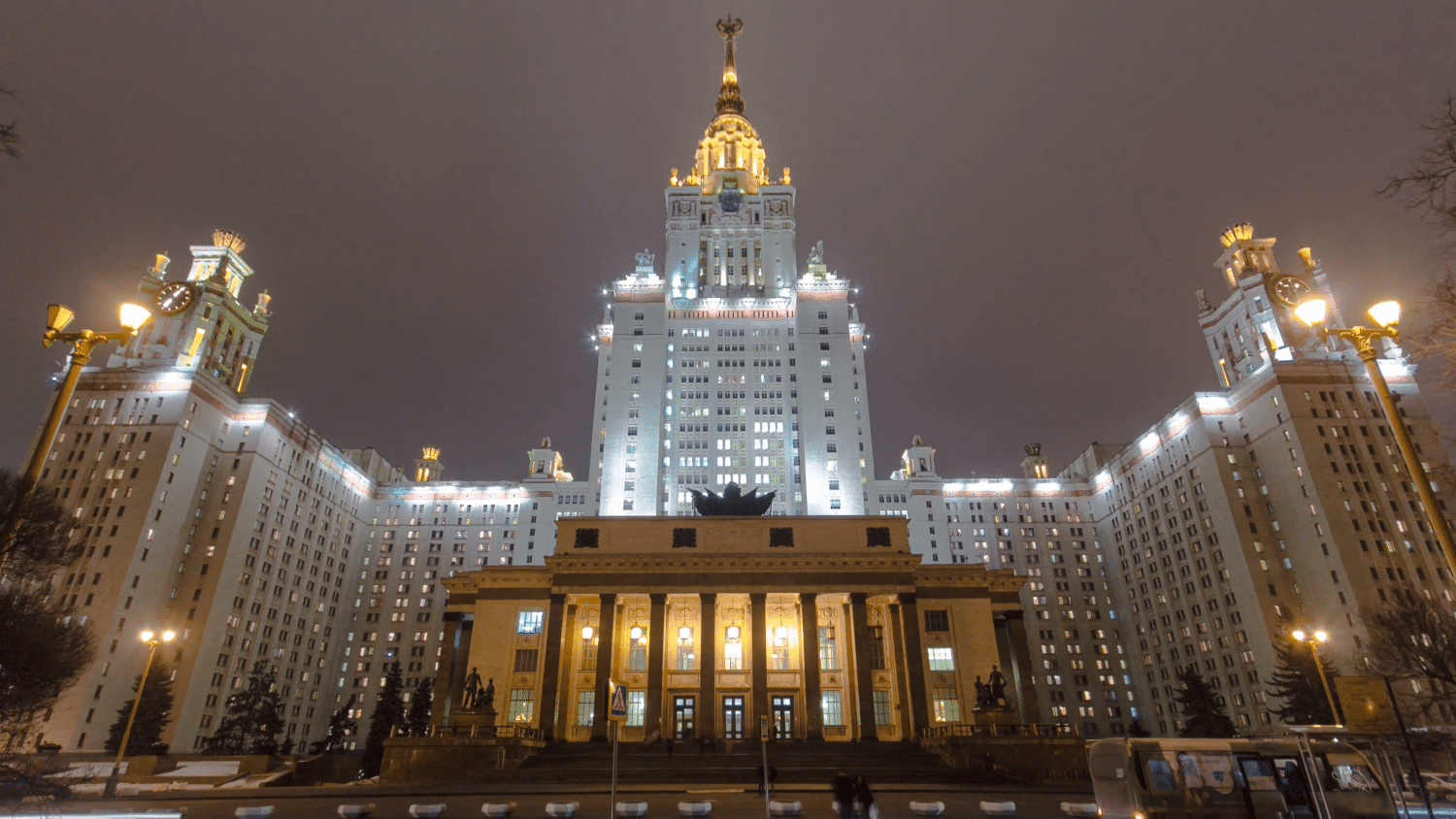Although the introduction of the Unified State Exam (USE) was meant to largely replace university entrance exams, many universities, especially those with prestigious programs, continue to require applicants to take their specific entrance exams. The USE is now simply an additional requirement.
Olga Dmitraschenko entered Moscow State University in 2006, after completing her high school experience via home schooling. She wrote of her experience taking MSU’s entrance exams in a previous installment as well as in the continuation that follows as part of a series of free Russian lessons sponsored by SRAS called Olga’s Blog. The blog documents – in simplified, modern Russian – her experience finishing high school, starting college, and living life in Moscow in 2006. The text, links, and format of this resource were last updated in 2023.
Briefly About University Entrance Exams in Russia
University entrance exams are usually designed to test the applicant’s knowledge and skills specifically in the field of study they wish to pursue. Many universities in Russia require university-specific entrance exams in addition to the Unified State Exam (USE).
Examples of such universities include Saint Petersburg State University, Novosibirsk State University, Higher School of Economics in Moscow, Moscow Institute of Physics and Technology, and Bauman Moscow State Technical University.
Most of these institutions first developed their entrance exams after they founded under the USSR. The exams have undergone a number of changes through the years, including in particular the dropping of a section on Marxist ideology, which was once standard for most applicants.
Moscow State University, much like other major institutions of high education, offers two tracks for entrance. The first is essentially a full scholarship with the tuition paid by the state and even a small stipend given to the student for living expenses. These are referred to as “budget” slots, as they are paid for from the state budget. The other track offers enrollment with tuition paid for by the student. The former requires what is referred to as simply an entrance exam, while the latter requires participation in something termed an “Olympiad.” Both are similarly structured, however, and applicants can and often do take both to insure that they can secure a place in their desired program under the most favorable conditions possible.
In the text below, Olga participates in the Olympiad as a way to prepare for the regular entrance exams and then takes the entrance exams themselves.
University Entrance Exams in Russia: Simplified Russian Text from Olga’s Blog
This is Lesson 5 of Olga’s Blog, a series of intermediate Russian lessons.
Note that:
- All of the bold words and phrases have annotation below.
- Red words and phrases indicate the subject of this blog entry’s grammar lesson.
- *Asterisks indicate slang.
The following text is a continuation from that given in Lesson 4.
Английский язык проходил легче и спокойнее. Нам выдали задание, которое состояло из трех частей:
1. перевести политический текст с английского на русский язык;
2. задать к тексту пять вопросов (общий, альтернативный, специальный, разделительный и вопрос к подлежащему);
3. написать мини-сочинение на указанную тему (мне выпала тема «Why did you choose to enter our faculty?»)
На второй экзамен нам тоже отвели четыре часа. Результаты каждого экзамена говорили сразу через два дня. Я получила пятерку!
Следующий экзамен был самым страшным, он наводил ужас* даже на самых непоколебимых и стойких – история России устно. Перед экзаменом нас разделили на семь групп по десять-двенадцать человек. Каждую группу поместили в отдельную комнату с двумя экзаменаторами. По очереди мы вытянули билеты. Всего их было семьдесят два. Мне повезло – я вытянула первый билет, который я хорошо знала. На подготовку отвели 45 минут времени. А потом стали вызывать.
Я отвечала первой. Было очень страшно, но через десять минут все закончилось, и мне поставили пятерку. Я радостная и счастливая выбежала из второго гуманитарного корпуса МГУ, даже не задумываясь о том, что через два с половиной месяца мне предстоит пройти через все это снова. Ведь олимпиада, как я уже говорила, проводилась на платные места, а я хотела поступать на бюджет. Если на олимпиаде ученик набирает четырнадцать баллов, он все равно поступает на платное отделение, потому, что это олимпиада, а не экзамен. Поэтому, набрав четырнадцать баллов, я очень жалела, что это всего лишь олимпиада, ведь идти на платный мне не хотелось. Многие мои друзья с курсов, набрав тринадцать баллов, поступили. Я им немного завидовала – ведь у них все уже закончилось, а у меня все было только впереди.

Два месяца пролетели незаметно, и пришло время сдавать экзамены во второй раз. Мне было уже не так страшно, ведь я уже знала какого это. Написанное мной сочинение содержало несколько небольших ошибок но было оценено хорошо. Все прошло отлично, и после последнего экзамена в моем экзаменационном листе стояли вот такие оценки:
Сочинение – 4
Английский язык – 5
История России – 5
Я набрала столько же баллов, сколько и на олимпиаде – четырнадцать! А это означало, что я поступила на бюджет. Несколько дней я ходила такая счастливая, что не могла поверить в то, что поступила. Друзья и знакомые звонили и поздравляли меня. Вот и вся моя история поступления в университет. В следующий раз мы поговорим про мой первый месяц в МГУ, а пока – удачи! Самое главное – желание учиться, стремление к цели и, конечно же, поддержка семьи и друзей.
Vocabulary and Cultural Annotations
Задать к тексту пять вопросов: Ask five questions of the text. The questions were meant to be posed as part of the test and not answered. English has specific methods of asking questions which can be difficult for Russians to grasp – primarily because of the required placements of auxiliary verbs. In Russian, auxiliary verbs are not used and word placement is not as strictly defined as in English. Thus, each question type (some of which Olga lists) must be studied individually. Very often, however, Russians who do speak English will know far more about English grammar and language theory than most Americans.
Общий вопрос: Yes/No Question. A question meant to be answered with a “yes” or “no” answer. In English:Are you tired? In Russian: Ты устала? Note that in English the placement of the auxiliary verb is essential while in Russian the only thing that changes is the punctuation and inflection.
Альтернативный вопрос: Alternative question. A question in which the listener is given a series of choices to chose from. Would you like to go to the theatre or the movies? Хотите пойти в театр или в кино?
Специальный вопрос: W-H question. A question using one of the 8 “question words:” who, what, where, when, how, why, which, and whose. English: Who is that man? Why is he standing there? Russian: Кто этот человек? Зачем он там стоит? Note that in Russian there are ten question words: Кто, Что, Где, Куда, Когда, Как, Почему, Зачем, Какой, Чей with two unique variants each for “where” and “why.”
Разделительный вопрос: Tag question. A question composed of a statement followed by a question tag. English: You’re an accountant, aren’t you? Russian: Ты бухгалтер, ни так ли? Note that in English this structure is much more commonly used than in Russian. “Неправда лы” is also used in Russian tag questions.
Вопрос к подлежащему: Subject question. A question which seeks more information about the subject. English: Who is that man? Russian: Кто этот человек? This is as opposed to a question which seeks more information about the object or action of the subject. English: Which book is that? Russian: Какая эта книга? Note that in English, there is a different placement of the auxiliary verb with each type of question. In Russian, the structure is identical.
Отвести/отводить: To set or assign. The verb is also used to mean “to lead,” “to take away,” “to deflect,” and sometimes “to reject” (a candidate for a job, a potential juror).
Навести/наводить ужас: Slang Russian term meaning “to terrify.” The term would literally translate “to cover/coat with horror.” Standard phrasings to use include “ужасать,” “вселять ужас,” or “внушать ужас.” Навести/наводить most often translates as “to direct” or “to aim.”
История России устно: The history of Russia from memory (by heart). Russian school children are generally expected to memorize important dates, events, and names and be able to recall them at any time during their education – many educated adults can still recite exact dates and names from memory.
Всего их было семьдесят два: In total they were seventy-two. Note there were also seventy two students participating in the Olympiada. Each student thus received an individual question, ensuring that each would have to prepare an individual answer. It also shows the depth to which Russians are expected to learn their history.
Второго гуманитарного корпуса МГУ: The Second Humanitarian Building of MGU. MGU has two main buildings devoted to teaching humanitarian subjects. The Second Humanitarian Building is also where most of SRAS’s language courses are based.
Мне предстоит: It is in store for me / I will have to.
У меня все было только впереди: It was all still ahead of me. This structure is quite common in modern Russia when talking about projects in the future.
Означать: To mean or signify. Often the word обозначить/обозначать is also used, which can have the additional meaning of “to label” or “to designate.”
Твоя Ольга: Your (Yours,) Olga. This is a common and affectionate way of ending letters. This affectionate construction is also often used with the word “наш” (our). For example: Наша Ольга успешно сдала все экзамены (Our Olga successfully passed all her exams)
Grammar Focus: Past Passive Participles
This is Lesson 5 of Olga’s Blog, a series of free intermediate Russian lessons. This is also the fifth installment dealing with participles in Russian. Previous editions have given instruction on present active participles, participles without referents, past active participles, and present passive participles.
In all examples, the participle is in bold, the word it refers to is underlined.
Verbs in Russian, like those in English, have forms that may be used as adjectives. These forms, known as participles, are often used as a simple way to provide variety and flexibility to sentence structures.
Past passive participles create constructions in which what would ordinarily be the object of the sentence becomes the subject. In English, past passive participles are most often formed by adding –ed to the base form of the verb (though they are very often irregular). In the example, “the lecture delivered by the professor held the interest of all those who listened,” “delivered” is a past passive participle which modifies “lecture.” The structure is remarkably similar in Russian: “лекция, прочитанная профессором, заинтересовала всех слушателей.” In both cases, “lecture” (“лекция”) is the object acted upon by the professor.
Today’s “Olga’s Blog” also presents an example of this: “написанное мной сочинение содержало несколько небольших ошибок,” “написанное” is a passive past participle referring to “сочинение.” This example would roughly translate as: “The essay written by me contained a few small mistakes.” The essay is the object acted on by Olga, but here is the subject of the sentence thanks to the passive participle construction.
Past passive participles can be formed only from perfective, transitive verbs.
The past participle is formed from the stem of the past tense:
Прочитать (to read) – прочитал (he read) – прочитанный (read)
Увидеть (to see) – увидел (he saw) – увиденный (seen)
Сделать (to make) – cделал (he did) – сделанный (made)
Изучить (to study) – изучил (he studied) – изученный (studied)
Принести (to bring) – принес (he brought) – принесенный (brought)
Note: while the basic idea of past passive participle construction can be grasped from the above, not that the rules for the construction are actually quite subtle (note the necessary change of “и” to “е” in ” изученный.” For a fuller explanation of the rules (and other forms), see this page from Alphadictionary.com.
Important! Participles must be declined as adjectives for gender, number, and case! Simply change the –ый ending to suit. For example:
Nominative Case: изученный (m.); изученная (f.); изученное (n.); изученные (p.)
Genitive Case: изученного (m.); изученной (f.); изученного (n.); изученных (p.)
Examples from Literature and the Press
Все больше становилось книг на полке, красиво сделанной Павлу товарищем-столяром М. Горький
Ни ужаса от только что увиденного, ни каких-либо иных чувств он не испытывал. С. Михайлов
Ему вспоминалась история падшей женщины, прочитанная им когда-то, и он находил теперь, что этот человеческий образ с виноватой улыбкой не имеет ничего общего с тем, что он теперь видит. А. Чехов
Я перебирал сотни вариантов всевозможных значений увиденных мною комбинаций знаков. И. Росоховатский
К тому же, к слову сказать, я воспитанный, скромный и честный малый. А. Чехов
(In this example, it is not clear who is the person who has acted on speaker, but it can be understood to be his parents and community.)
Important! In Russian, all adjectives have a long and short form and passive past participles often take the short form. Today’s “Olga’s Blog” also gives an example of the short form if we look at the full compound sentence of the original example: Написанное мной сочинениесодержало несколько небольших ошибок но было оценено хорошо.” “Оценено” is a short-form passive past participle which also refers to “сочинение.” This entire phrase could be translated as “The essay written by me contained a few small mistakes but was appraised (graded) well.”
Оценить (to appraise) – оценил (he appraised) – осененный (appraised)
The short form is constructed from the long form. For example:
Оцененный – оценен (m.) оценена (f.); оценено (n.); оценены (p.)
Изученный – изучен (m.); изучена (f.); изучено (n.); изучены (p.)
Cделанный – сделан (m.); сделана (f.); сделано (n.); сделаны (p.)
Important! Short form past passive participles exist only in the nominative case! Long form and short form past passive participles are also, therefore, used differently. Long forms can be used to modify any noun. The short form, because it only exists in the nominative case, can only modify the subject of the sentence and usually tell us what he/she/it is doing.
Generally, short-form participles follow a form of the verb “to be” — whether implied (as in nearly all instances of the present tense of “be” in Russian) or stated (“bylo,” “budet”).Compare:
Short-form:
Лучшее сочинение было (будет) написано Ольгой. (The best composition was [will be] written by Olga.)
Long-form:
NOM. Сочинение, написанное Ольгой, очень понравилось экзаменаторам. (The composition. written by Olga pleased the examiners very much.)
ACC. Экзаменаторы читали написанное Ольгой сочинение с интересом. (The examiners read the composition written by Olga with interest.)
GEN. У меня нет копии сочинения, написанного Ольгой. (I don’t have a copy of the comp. written by Olga.)
PREP. В написанном Ольгой сочинении было несколько ошибок. (In the comp. written by Olga there were a few errors.)
Also, the long form is usually placed before the noun it modifies, while the short form is placed after (though not always). For example: Написанное письмо but письмо написано; прочитанная книга but книга прочитана.
Lastly, short form and long form adjectives may also be used without a referent, as was discussed in previous issues of “Olga’s Blog,” (such as 1.2). In this case, the adjective will be in neuter form: “там написано что нельзя курить,” which can be translated as “it was (has been) written there that it was (is) forbidden to smoke.” In the case of passive past participles, the implied referent can be discerned from the context.
Так написано… – Написано, написано, – успокоил я. – Там много чего написано. В. Покровский
Нет уж, никак нельзя сказать, что грибы изучены основательно. В. Солоухин
Сделано в Руссии. (Many raw hydrocarbons, and a surprising number of the world’s other valuable resources!)
More Free Russian Lessons From Olga’s Blog

The Circus in Russia: Olga’s Blog
Olga here turns her attention to the modern Russian circus, describing what it is like to attend a contemporary performance, from the atmosphere inside the circus building to the acts that still draw enthusiastic audiences today. Written in simplified, modern Russian, her account offers a firsthand glimpse into how a traditional cultural institution continues to […]

The Language and History of Caviar: Olga’s Blog
Olga below describes the place of caviar in Russian food culture. In simplified Russian, she describes where the delicacy is harvested from, the major types of caviar, and how the types differ in cost and quality. We also provide an English primer below discussing more of the history of caviar, how it is eaten and […]

Mushrooms in Cultures and Cuisines: Olga’s Blog
Olga below continues her discussion of the deeply held place that mushrooms have in Russian culture. In part one of this discussion, she focused on how and where and find the mushrooms. In part two, below, she discusses how the mushrooms are preserved, prepared, and consumed. A staple of the regional diet for centuries, mushrooms […]

Mushroom Season Has Begun! Olga’s Blog
Olga below discusses the deeply held national tradition of mushroom gathering. An important part of Russian food tradition for many centuries, Russian children are taught in school from an early age to tell the difference between various types of native mushrooms. Many, like Olga, will go with relatives and friends to the woods to put […]

Study Abroad in America for Russians: Olga’s Blog
As part of her major program in international relations at Moscow State University, Olga applied to study abroad in the United States in 2007. As was not uncommon for students applying for study abroad in either direction, Olga hit several bureaucratic snags. What is perhaps most remarkable about the below text, however, is the description […]





